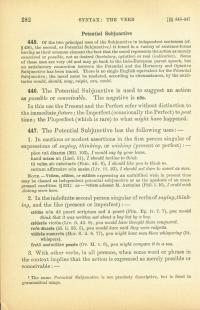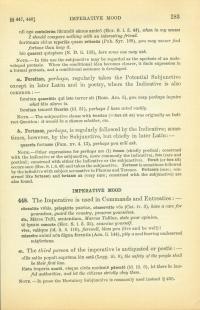445. Of the two principal uses of the subjunctive in independent sentences (cf. § 436), the second, or Potential Subjunctive,1 is found in a variety of sentences whose common element is the fact that the mood represents the action as merely conceived or possible, not as desired (hortatory, optative) or real (indicative). Some of these uses are very old and may go back to the Indo-European parent speech, but no satisfactory connection between the Potential and the Hortatory and optative subjunctive has been traced. There is no single English equivalent for the Potential Subjunctive; the mood must be rendered, according to circumstances, by the auxiliaries would, should, may, might, can, or could.
446. The Potential Subjunctive is used to suggest an action as possible or conceivable. The negative is nōn. In this use the present and the perfect refer without distinction to the immediate future; the imperfect (occasionally the perfect) to past time; the pluperfect (which is rare) to what might have happened.
447. The Potential Subjunctive has the following uses:
- In cautious or modest assertions in the 1st person singular of expressions of saying, thinking, or wishing (present or perfect).
Pāce tuā dīxerim. (Mil. 103)
I would say by your leave.haud sciam an (Lael. 51)
I should incline to thinkVelim sīc exīstimēs. (Fam. 12.6)
I should like you to think so.certum affīmāre nōn ausim (Liv. 3.23)
I should not dare to assert as sureNote— Vellem, nōllem, or māllem expressing an unfulfilled wish in present time may be classed as independent Potential Subjunctive or as the apodosis of an unexpressed condition (§ 521).
Vellem adesset M. Antōnius. (Phil. 1.16)
I could wish Antony were here. - In the indefinite 2nd person singular of verbs of saying, thinking, and the like (present or imperfect).
Crēdās nōn dē puerō scrīptum sed ā puerō (Plin. Ep. 4.7.7)
You would think that it was written not about a boy but by a boy.Crēderēs victōs. (Liv. 2.43.9)
You would have thought them conquered.Reōs dīcerēs (id. 2.35.5)
You would have said they were culprits.Vidērēs susurrōs. (Hor. S. 2.8.77)
You might have seen them whispering.
(lit. whispers)Fretō assimilāre possīs.(Ov. M. 5.6)
You might compare it to a sea. - With other verbs, in all persons, when some word or phrase in the context implies that the action is expressed as merely possible or conceivable.
Nīl ego contulerim iūcundō sānus amīcō. (Hor. S. 1.5.44)
When in my senses I should compare nothing with an interesting friend.Fortūnam citius reperiās quam retineās. (Pub. Syr. 168)
You may sooner find fortune than keep it.aliquis dīcat (Ter. And. 640)
somebody may sayNote— In this use the subjunctive may be regarded as the apodosis of an undeveloped protasis. When the conditional idea becomes clearer, it finds expression in a formal protasis, and a conditional sentence is developed.
a. Forsitan (perhaps) regularly takes the Potential Subjunctive except in later Latin and in poetry, where the indicative is also common.
Forsitan quaerātisquī iste terror sit. (Rosc. Am. 5)
You may perhaps inquire what this alarm is.
Forsitan temerē fēcerim. (id. 31)
Perhaps I have acted rashly.
Note— The subjunctive clause with forsitan ( = fors sit an) was originally an indirect question: it would be a chance whether, etc.
b. Fortasse (perhaps) is regularly followed by the indicative; sometimes, however, by the subjunctive, but chiefly in later Latin.
Quaerēs fortasse. (Fam. 15.4.13)
Perhaps you will ask.
Note— Other expressions for perhaps are (1) forsan (chiefly poetical; construed with the indicative or the subjunctive, more commonly the indicative), fors (rare and poetical; construed with either the indicative or the subjunctive). Forsit (or fors sit) occurs once (Hor. S. 1.6.49) and takes the subjunctive. Fortasse is sometimes followed by the infinitive with subject accusative in Plautus and Terence. Fortassis (rare; construed like fortasse) and fortasse an (very rare; construed with the subjunctive) are also found.


